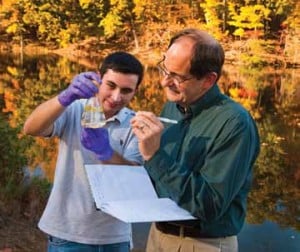 As a student at the nationally acclaimed High Technology High School in Lincroft, New Jersey, Brian Shell ’12 had an inkling that he wanted to pursue water studies. He had teamed up with a Rutgers University professor on research looking at water issues. He hoped to continue that work, at Johns Hopkins University.
As a student at the nationally acclaimed High Technology High School in Lincroft, New Jersey, Brian Shell ’12 had an inkling that he wanted to pursue water studies. He had teamed up with a Rutgers University professor on research looking at water issues. He hoped to continue that work, at Johns Hopkins University.
But he knew family resources would be a factor. The son of a schoolteacher and environmental planner, Shell began looking at schools after his junior year. He contacted Hopkins because he wanted to work with nationally acclaimed water expert Edward J. Bouwer, the Abel Wolman Professor of Environmental Engineering and chair of the Department of Geography and Environmental Engineering. “Hopkins was always my first choice,” Shell says. “But I didn’t want to fall in love because of the financial constraints.”
Within months, Shell was in a difficult spot. He had been offered two full-tuition merit scholarships to other top academic institutions. His parents promised him they would make Hopkins work, but he felt uneasy turning down other offers. Then, on his birthday, Whiting School Vice Dean for Education Ed Scheinerman called. He had been selected for the Charles R. Westgate Scholarship in Engineering.
“It was such a relief, such a weight lifted off my shoulders,” Shell says. “My mother was teaching. I couldn’t call her. So I called my dad at the office. We waited to give her the great news.”
At Hopkins, Shell has fulfilled his dream. He works in Bouwer’s lab with grad student Katie Onesios. They conduct research on PPCPs—pharmaceuticals and personal care products— that are not removed during the traditional wastewater treatment process. The goal is to characterize the removal of PPCPs from treated wastewater as it undergoes soil aquifer treatment, which is a water recycling process where passage through soil purifies water. The goal: develop a technology capable of cleaning water to levels safe for irrigation and even drinking water.
Shell dove into Hopkins’ extracurricular life, too. He is a member of the Student Admissions Advisory Board and the HOP (Hopkins Organization for Programming), with which he helps plan, advertise, and run campus events, and has served as a student alumni ambassador and an admissions interviewer.
After his sophomore year, Shell turned to Hopkins again for an even more critical need. Since birth he had been followed by a New York hospital for a congenital heart condition known as mitral valve regurgitation. Surgery became necessary. “We were told that I should consider surgery sooner to avoid the need for a heart transplant later,” he says. Although Shell’s medical insurance would have allowed him to have surgery anywhere, the family’s confidence in Hopkins led them to transfer his medical care to Johns Hopkins Hospital, where Luca Vricella performed surgery last summer.
This semester, Shell has slowed his pace slightly. But he hasn’t let open-heart surgery dim his dreams. Upon graduation, he plans to work for an environmental consulting company before returning to academia to pursue a PhD. Eventually, he intends to return the financial support he received to other deserving students in the form of his own scholarship fund. “If I play my cards right, that’s my hope,” says the soft-spoken junior. “That would be awesome… That would be really, really cool.”




